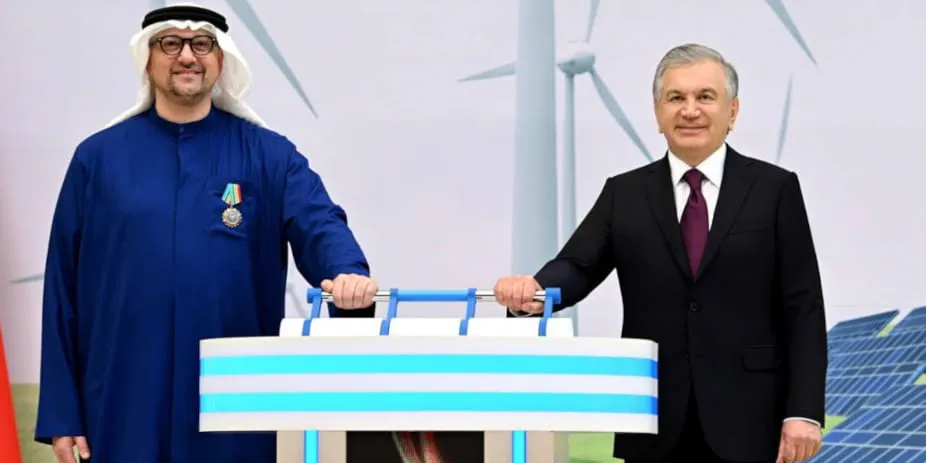
Masdar Partners In Uzbekistan's Largest Battery Storage Project

Masdar, a global leader in renewable energy, has signed a landmark agreement to develop Uzbekistan's largest standalone battery energy storage system in the Navoiy region. The deal marks a significant step in the country's energy transformation as it seeks to bolster grid reliability and enhance the integration of renewable energy sources. The 600 MW / 600 MWh BESS will be pivotal in supporting Uzbekistan's growing renewable energy infrastructure.
This ambitious project is a direct response to the increasing demand for reliable and efficient energy storage solutions that can support the transition to greener, more sustainable energy systems. Battery energy storage systems like the one planned in Navoiy are designed to store excess energy generated by renewable sources such as solar and wind. This stored energy can then be released into the grid when production from renewables is low, ensuring a continuous and reliable power supply.
The partnership between Masdar and Uzbekistan is seen as a strategic move to strengthen the country's energy infrastructure. As part of its broader efforts to reduce its reliance on fossil fuels, Uzbekistan has committed to expanding its renewable energy capacity, with solar and wind projects at the forefront of these efforts. The Navoiy battery storage system will play a crucial role in addressing the intermittency issues often associated with renewable energy generation, such as fluctuations in solar and wind availability.
The significance of this project extends beyond just energy storage. It represents a broader shift towards modernising Uzbekistan's entire power grid, with the introduction of advanced technologies that support the integration of renewable energy on a larger scale. The country has already seen positive developments in this regard, with a series of large-scale solar and wind projects being developed across various regions.
See also Biofuels Emit More CO2 Than Fossil Fuels, New Study WarnsThe Navoiy battery storage facility is expected to be operational by 2027. Once complete, it will have a profound impact on the country's energy landscape, contributing to improved grid stability, especially during periods of peak demand. Furthermore, it will help reduce reliance on fossil fuels by facilitating the use of clean, renewable energy when demand is high, thus driving down carbon emissions and advancing Uzbekistan's climate goals.
The move also underscores the growing importance of energy storage in the global transition to sustainable energy. As more countries shift towards renewable sources, the need for efficient storage solutions becomes increasingly critical. Energy storage technologies, like the one being developed in Navoiy, are integral to the success of clean energy systems, as they provide the flexibility needed to balance supply and demand in real-time.
Uzbekistan's energy sector has undergone significant reforms in recent years, aiming to modernise infrastructure and increase the share of renewables in its energy mix. The Masdar project is another example of how international collaborations are helping to accelerate these efforts. The partnership is expected to bring significant technical expertise to the country, helping to create a more resilient and sustainable energy system for the future.
As part of the agreement, Masdar will also work closely with local stakeholders, ensuring the project benefits from local knowledge and expertise. This approach is part of a broader trend in energy development, where international companies collaborate with local governments and organisations to foster long-term sustainability and economic growth.
The Navoiy battery storage system will be a crucial asset in supporting Uzbekistan's energy ambitions, which include reaching a renewable energy capacity of 5,000 MW by 2030. This aligns with the country's broader goals to reduce greenhouse gas emissions and transition towards a low-carbon economy.
See also FAB Deepens Blue Finance Footprint with $20M BondThe project's successful implementation is expected to stimulate further investments in the renewable energy sector, not only in Uzbekistan but also in the wider Central Asian region. The development of large-scale energy storage systems like this will play a critical role in shaping the future of energy in countries that are still heavily reliant on traditional energy sources.
via Greenlogue____________________________________
This article first appeared on Greenlogu and is brought to you by Hyphen Digital Networ
Notice an issue? Arabian Post strives to deliver the most accurate and reliable information to its readers. If you believe you have identified an error or inconsistency in this article, please don't hesitate to contact our editorial team at editor[at]thearabianpost[dot]com. We are committed to promptly addressing any concerns and ensuring the highest level of journalistic integrity.
Legal Disclaimer:
MENAFN provides the
information “as is” without warranty of any kind. We do not accept
any responsibility or liability for the accuracy, content, images,
videos, licenses, completeness, legality, or reliability of the information
contained in this article. If you have any complaints or copyright
issues related to this article, kindly contact the provider above.


















Comments
No comment